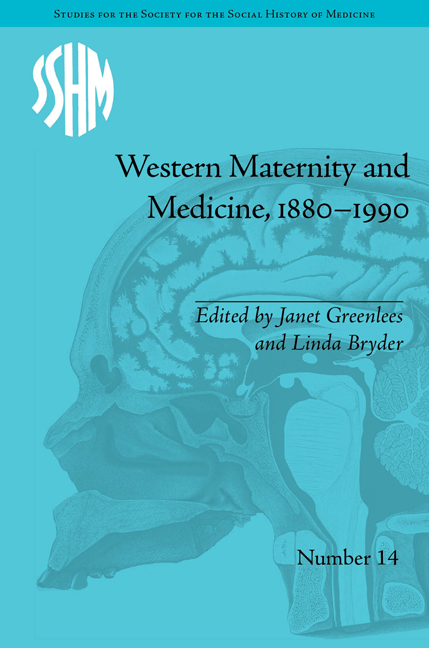Book contents
- Frontmatter
- CONTENTS
- Acknowledgements
- List of Contributors
- List of Tables
- Western Maternity and Medicine: An Introduction
- 1 Safely Delivered? Insights into Late Nineteenth-Century Australian Maternity Care from Coronial Investigations into Maternal Deaths
- 2 Pregnancy, Pathology and Public Morals: Making Antenatal Care in Edinburgh around 1900
- 3 ‘The Peculiar and Complex Female Problem’: The Church of Scotland and Health Care for Unwed Mothers, 1900–1948
- 4 Taking ‘Advantage of the Facilities and Comforts … Offered’: Women's Choice of Hospital Delivery in Interwar Edinburgh
- 5 ‘What Women Want’: Childbirth Services and Women's Activism in New Zealand, 1900–1960
- 6 'Twixt God and Geography: The Development of Maternity Services in Twentieth-Century Ireland
- 7 Test Tubes and Turpitude: Medical Responses to the Infertile Patient in Mid-Twentieth-Century Scotland
- 8 Women's Experiences of the Maternity Services in Berkshire and Oxfordshire, c. 1970–1990
- 9 From Muller to Johnson Controls: Mothers and Workplace Health in the US, from Protective Labour Legislation to Fetal Protection Policies
- Notes
- Index
7 - Test Tubes and Turpitude: Medical Responses to the Infertile Patient in Mid-Twentieth-Century Scotland
- Frontmatter
- CONTENTS
- Acknowledgements
- List of Contributors
- List of Tables
- Western Maternity and Medicine: An Introduction
- 1 Safely Delivered? Insights into Late Nineteenth-Century Australian Maternity Care from Coronial Investigations into Maternal Deaths
- 2 Pregnancy, Pathology and Public Morals: Making Antenatal Care in Edinburgh around 1900
- 3 ‘The Peculiar and Complex Female Problem’: The Church of Scotland and Health Care for Unwed Mothers, 1900–1948
- 4 Taking ‘Advantage of the Facilities and Comforts … Offered’: Women's Choice of Hospital Delivery in Interwar Edinburgh
- 5 ‘What Women Want’: Childbirth Services and Women's Activism in New Zealand, 1900–1960
- 6 'Twixt God and Geography: The Development of Maternity Services in Twentieth-Century Ireland
- 7 Test Tubes and Turpitude: Medical Responses to the Infertile Patient in Mid-Twentieth-Century Scotland
- 8 Women's Experiences of the Maternity Services in Berkshire and Oxfordshire, c. 1970–1990
- 9 From Muller to Johnson Controls: Mothers and Workplace Health in the US, from Protective Labour Legislation to Fetal Protection Policies
- Notes
- Index
Summary
In recent decades, reproductive health has constituted a vibrant field of scholarship. The increasing availability of safe and effective means of fertility control – birth control and abortion – and the social politics surrounding it have comprised an important focus. Social historians have tended to locate this trend within the general programme of so-called ‘permissive’ measures introduced to Britain during the ‘Swinging Sixties’, measures that reconfigured the role of the state in issues relating to sexual morality, with some consideration of the important role which the medical profession has assumed within reproductive health policymaking and the implementation of that policy. Meanwhile, feminist interpretations have tended to view policy formation as a political struggle that strongly reflected the ideological prejudices of a patriarchal society, and have been sharply critical of the ‘medicalization’ of reproductive health, which arguably left British women ‘dependent on the vagaries of medical discretion and good will’.
The history of infertility in modern Britain has, by comparison, been under-explored. Naomi Pfeffer's 1993 monograph The Stork and the Syringe remains the most comprehensive work on the subject, and provides an important introduction to medical responses to infertility, set within their wider social and political context. Assisted reproduction – the use of techniques such as artificial insemination and in vitro fertilization to enhance fertility – has elicited heated debate from a range of scholars, including social anthropologists and sociologists.
- Type
- Chapter
- Information
- Western Maternity and Medicine, 1880–1990 , pp. 113 - 128Publisher: Pickering & ChattoFirst published in: 2014



